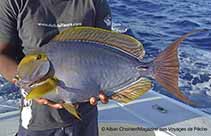| Family: |
Acanthuridae (Surgeonfishes, tangs, unicornfishes), subfamily: Acanthurinae |
| Max. size: |
70 cm TL (male/unsexed); max. reported age: 29 years |
| Environment: |
reef-associated; marine; depth range 1 - 100 m |
| Distribution: |
Indo-Pacific: coast of East Africa to the Hawaiian Islands and French Polynesia, north to southern Japan, south to the Great Barrier Reef and New Caledonia. Eastern Pacific: lower Gulf of California and Clipperton Island to Panama and the Galapagos Islands. |
| Diagnosis: |
Dorsal spines (total): 8-9; Dorsal soft rays (total): 25-27; Anal spines: 3-3; Anal soft rays: 23-25. Body purplish gray when alive; grayish brown when preserved; a region of dull yellow in front of eye, a lesser extension posterior to lower part of eye; outer 1/3 of pectoral fin yellow, extreme distal part hyaline; dorsal and anal fins yellowish grey basally, dull yellow distally; caudal fin base whitish; caudal fin purplish. Anterior gill rakers 16-24, posterior 17-22. Caudal spine small.
Description: Characterized further by having length of caudal spine 4.4-5.7 in head length; greatest depth of body 1.9-2.3 in SL (Ref. 90102). |
| Biology: |
Live in various reef habitats, sand slopes and lagoons (Ref. 48637). Juveniles inhabit shallow, protected, turbid inshore waters while adults prefer deeper areas of protected bays and lagoons. Also in outer reef areas (Ref. 1602). Benthopelagic (Ref. 58302). Schooling species, feed on diatoms, detritus film of sand, filamentous algae, hydroids, and pieces of fish (Ref. 1602, 48637). Probably the only surgeonfish that readily takes bait (Ref. 12484). |
| IUCN Red List Status: |
Least Concern (LC); Date assessed: 04 May 2010 Ref. (130435)
|
| Threat to humans: |
venomous |
Source and more info: www.fishbase.org. For personal, classroom, and other internal use only. Not for publication.

